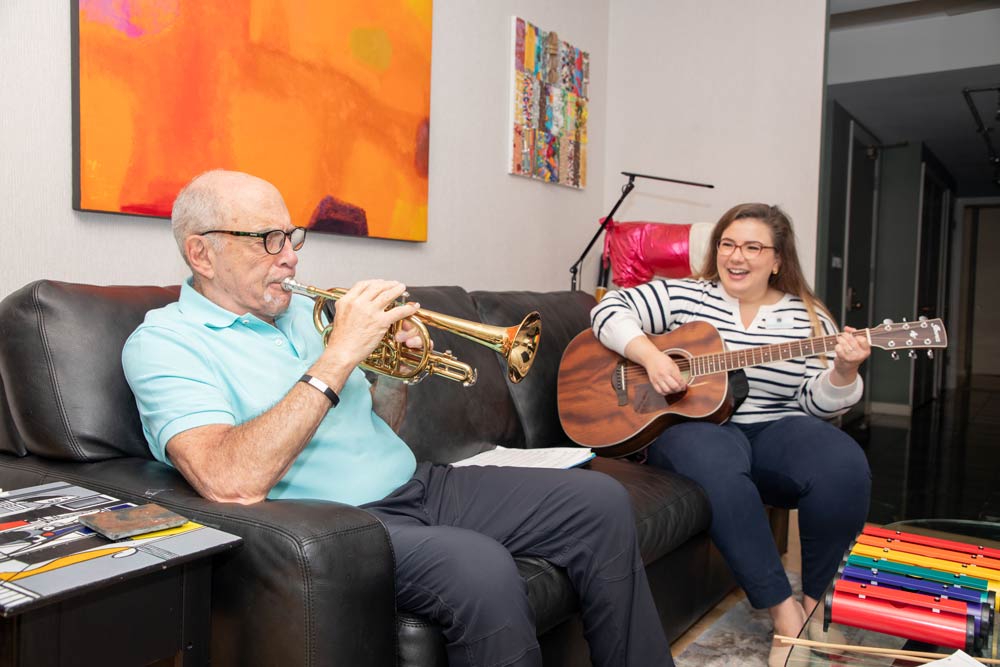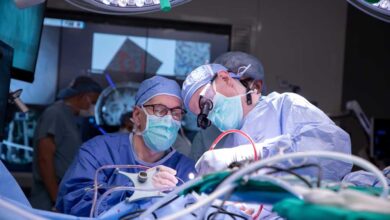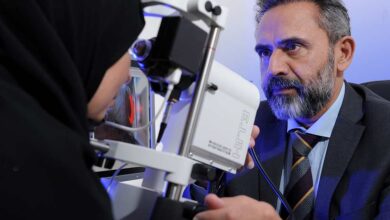UChicago Medicine adds music therapy option for Alzheimer’s and dementia patients
Provided by UChicago Medicine

Because he has frontotemporal dementia, Ted Oppenheimer can sometimes be apathetic and disoriented.
That isn’t the case, though, during his in-home music therapy sessions offered through The Memory Center — part of the University of Chicago Medicine’s Center for Comprehensive Care and Research on Memory Disorder.
Oppenheimer’s wife, Susan, calls music therapy his “best hour of the week” because Ted is engaged, attentive and excited to play his trumpet, an instrument he learned as a teenager but put down for decades prior to his diagnosis. During the sessions, Ted also gets to sing and play the xylophone.
“What song should we play next?” asks Ted’s music therapist, Mia Iliopoulos Krings, MM, CDP, MT-BC, from Greater Chicago Music Therapy Inc., during a recent session in his Chicago condominium.
Ted shuffles through his sheet music and picks Louis Armstrong’s “On the Sunny Side of the Street.”
Krings strums her guitar and sings. Ted picks up his trumpet and swings into the jazz standard. He’s having so much fun jamming, he holds the last note with emphatic vibrato. Everyone in the room applauds.
“I’d like to play Carnegie Hall one day,” he says with a smile.
Sometimes Susan tap dances along and she and Ted exchange glances. It’s a tender connection for the couple, married for 22 years, since Ted’s disease has impacted their quality of life and reduced Ted’s ability to socially engage and recognize emotions in others.
Positive experiences like these have encouraged physicians at The Memory Center to add music therapy to its creative arts therapy programming for patients with Alzheimer’s disease and related dementias.
“Music therapy is not typically offered in memory centers. It’s something special we’ve been focusing on and we want to continue to expand it,” said James Mastrianni, MD, PhD, Director of the Center for Comprehensive Care and Research on Memory Disorders.
The effort is being led by Kaitlin M. Seibert, MD, a behavioral neurologist uniquely suited for the job; she is both a behavioral neurologist and an amateur musician.
Since Ted also has senior onset asthma, he does a separate physical exercise program to improve his breathing, which in turn helps his trumpet playing. Deep breathing from singing and playing his trumpet also sends more oxygen to the brain, creating physiological benefits, Krings said.
“It makes people feel ‘better’ in their own individual way,” Krings said. “Ted said he felt ‘invigorated’ at the end of our last session.”
“Adapted sports provide him with physical strength. Music therapy gives him emotional pleasure,” Susan added. “When Ted and Mia sing, and Ted plays the trumpet and xylophone, our home is filled with joy.”
How music helps dementia patients
Music can be used in different ways based on what type of dementia a patient has and what symptoms are most noticeable.
In frontotemporal dementia (like Ted’s case), motivation and social cues can be targeted. Alternatively, in Alzheimer’s dementia, playing a favorite song can tap into deep parts of the brain that aren’t affected by the disease. It can trigger happy memories and feelings of joy, often bringing a smile to a person’s face. Examples of this can be seen in “Alive Inside,” a 2014 documentary film that inspires the Memory Center staff.
Music can be used to reduce depression, agitation and unwanted behaviors in people with dementia, Seibert said. A breakfast or bathtime song can help coax them to do routine tasks that may make patients uneasy. Frequent repetition or mood swings exhibited by patients can be difficult to manage, so sharing a song can be a good way to connect over something that is not dependent on memory or cognition.
“A patient might not be engaged or alert. But a lot of times, if you play music that is personally meaningful to them — a wedding song or something related to a pleasant memory — they light up and become engaged and may even sing along,” Seibert said. “A lot of patients’ family members have described this as ‘a back door to their cognition.’”
The board-certified music therapists who work with UChicago Medicine, like Krings, are trained to make eye contact with the patient, let them choose the music and encourage them to talk about each song. That engagement allows them to express themselves creatively and verbally, and can provide a feeling of success.
Caregivers seem to enjoy music therapy as much as the patients. That’s part of the goal of The Memory Center’s creative art therapies, Mastrianni said: reducing caregivers’ stress and improving the caregiver-patient relationship.
For now, music therapy is available as private, one-on-one sessions, but plans are in the works to make it more widely available and accessible. Currently, the barrier for most dementia patients is cost, as music therapy is not covered by Medicare or Medicaid.
“Music therapy costs money. To provide this for patients and truly measure its impact, we need to bridge the gap,” Seibert said.
The Memory Center offers less expensive (and free) creative art therapies, such as their nationally recognized “Art is … In” program, where participants receive a free, professionally curated art kit in the mail each week.
“Music, movement and arts are the key to a meaningful quality of life when you have dementia, and we want to tap into as much of that as possible,” said Tessa Garcia McEwan, AM, LCSW, CDP, one of the Memory Center’s dementia practitioners. “I try to give families not only access to care, stretching their dollars with care plans, but also a meaningful quality of life because there is currently no cure for these diseases.”
For more information, visit www.uchicagomedicine.org/global


















